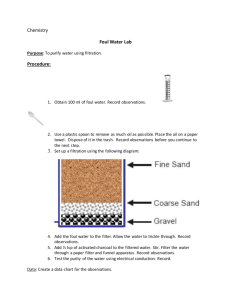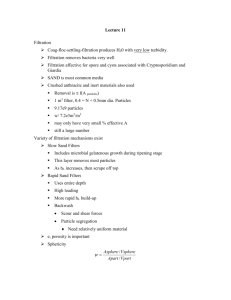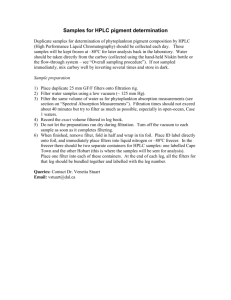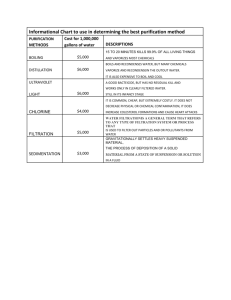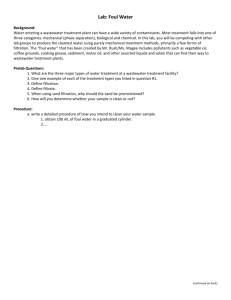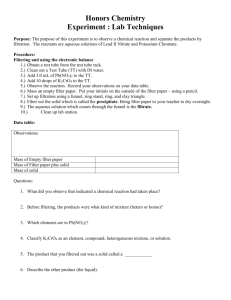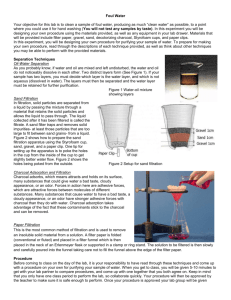what is filtration
advertisement
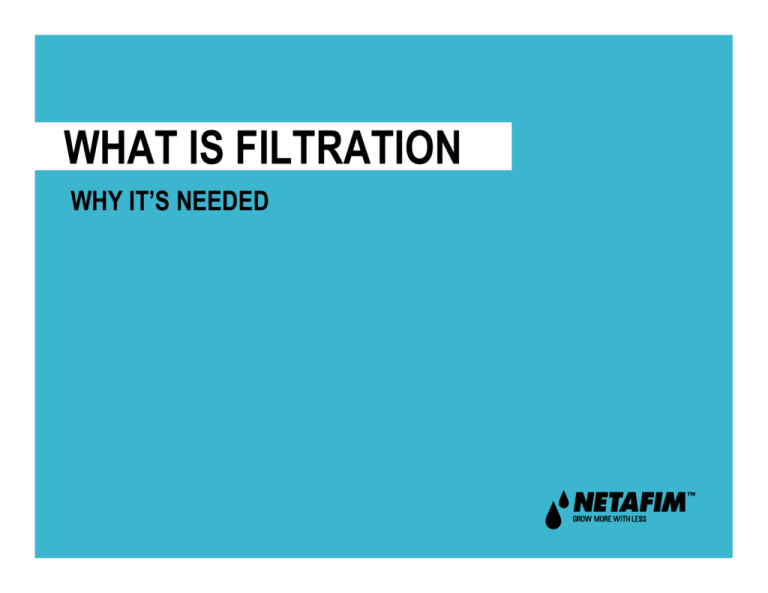
WHAT IS FILTRATION WHY IT’S NEEDED AUTOMATIC FILTER APPLICATIONS Parks and recreation fields Housing developments Large private homes Commercial landscape - Shopping malls, business parks, sports fields, schools and colleges, military bases - Golf courses 2 WHAT IS FILTRATION WHY DO YOU NEED IT Remove suspended solids from the water (mechanical filtration) Maintain proper operation of irrigation system Protect the dripper and the irrigation system from clogging Allows the irrigation system to operate optimally and lengthens its life 3 WHY GOOD FILTRATION IS IMPORTANT Water quality is getting worse throughout the USA Ponds, lakes and reservoirs with high algae and organic material have become common sources of water Reduces maintenance of sprinklers, valves, and drippers 4 MANUAL OR AUTOMATIC FILTER? MANUAL Only on clean water Otherwise, filter will never be cleaned on time AUTOMATIC Always cleans the filter on time Keeps drippers and sprinklers from clogging Maintains good pressure in your system Maintains good uniformity 5 Manual Disc Filter Automatic Disc Filter DIRTY CANAL WATER Water contains high levels of algae, organics and sometimes moss 6 UNFILTERED SURFACE WATER Debris has irregular shapes - long and skinny, soft and compressible Depth filtration provides the highest quality of filtration for this type of water 7 THREE TYPES OF FILTRATION Next One back Screen Technology -8- a-180700-gn-e Single Layer Filtration Sand Media Next -9- a-180700-gn-e One back Depth Filtration 8 Disc Technology FILTER SELECTION GUIDELINES (RULE OF THUMB) WATER SOURCE RECOMMENDED FILTRATION Well Water Disc, media or screen ▪ With heavy sand (>3ppm) Hydrocyclone, disc, media or screen ▪ With Iron or manganese Disc or sand media filter with chlorine Surface Water Depth filtration – disc or sand media Potable Water Disc or screen Reclaimed Water Disc or media 9 KNOW YOUR WATER SOURCE TYPE OF WATER Potable Pond or reservoir Well River or canal WATER QUALITY Good Average Poor Very poor 10 GOOD WATER QUALITY Municipal supply Well water from a clean aquifer - No sand - No iron or manganese 11 AVERAGE QUALITY WATER Wells with small amounts of sand (< 2 ppm) Clear surface water - Lakes - Ponds - Reservoirs - Canals 12 POOR WATER QUALITY Well water from a poor quality aquifer (> 2 ppm) Surface water in hot climates with increased biological growth and no chemical treatment - Lakes, ponds, rivers and canals 13 VERY POOR WATER QUALITY Well water with greater than 10 ppm of sand Rivers and muddy canals Lakes and ponds with severe runoff deposits Raw municipal wastewater 14 STRENGTHS AND WEAKNESSES THREE MAIN TYPES OF FILTRATION TECHNOLOGIES Sand media Screens Discs Galaxy Disc Filter AGF Sand Media Filter Scan-Kleen Screen Filter 15 SAND MEDIA FILTERS STRENGTHS WEAKNESSES Depth filter can trap dirt Large footprint Algae and organic material Requires assembly Iron (with chlorine acid or aeration) Long backflush cycle Surface water Need to change or add sand Channeling can occur 16 AUTOMATIC SCREEN FILTERS STRENGTHS WEAKNESSES Small footprint Less effective on surface water (algae) Good on clean well water Screens can pass organic debris Portable Screens can tear Short flush cycle Rust problems 17 AUTOMATIC DISC FILTERS STRENGTHS WEAKNESSES Depth filtration Backflushing requires higher pressures (40 psi vs. 35 psi for screen filters) Good for organics and During flush may require algae pressure sustaining valve to provide 40 psi Short backflush cycle Made of non-corrosive materials Small footprint Portable 18 SUMMARY Good Filtration is important and will reduce maintenance. Know your water source and water quality. Depth filters protect your irrigation system better than screen filters for all surface water sources. Automatic Disc Filters provides depth filtration with many benefits such as: - Small footprint - Easy installation - Corrosion Resistant 19 THANK YOU 20
